|

I've compiled a list of home remedies with the use of herbs, and some everyday things most people have around the house.
The following tips have been used by myself, on my own family, and by friends & relatives and are safe.
I do however, stress that if anyone has a medical condition such as HIV/AIDS/ any immune deficiency disorder, are on medications,
or are pregnant... please consult an expert before using any of the herbal suggestions listed. Some herbs interfere with man-made
medications and medical conditions and should not be used in combination. Though most are safe, I'd rather you use precautionary
measures if you're not sure.
People with children younger than 7 should not use some herbs to treat anything, though the listings with no herbal ingredients
are safe for any age over 2 ( if you can get children that young to try anything)
I only included things that I, personally, use or have used...both fresh and dried
I either have them in the house, or grow them in season,
The herbs I grow, dry and store until use for medicines or cooking
In The Kitchen
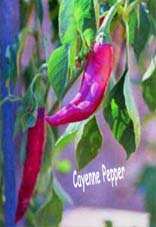
Cider Vinegar is a good sore throat remedy. A small amount, gargled with & spit out will soothe & sometimes cure a
sore or irritated throat. ( this, I've found, works much better than warm salt water)
Also, a couple tablespoons a day of cider vinegar is said to maintain health in general
Cider vinegar and a brown paper bag (soak bag in vinegar) wrapped around a sprain helps keep down swelling AND bruising
White vinegar by the teaspoon a few times a day helps curb appetite. My grand mother used this as an appetite supressant
for years (as did her Cherokee Indian mother) Dill pickle liquid has the same effect (it contains white vinegar)
Red onions contain an enzyme which works with the body to help prevent colds
Cayenne pepper is beneficial for a healthy female productive system balance
Helps prevent cluster headaches
Honey is a natural antibiotic. A few tablespoons a day, is said to promote general well being
(DO NOT give honey to infants or any child under the age of 2, it counteracts with the natural immune system & can do
more harm than good)
Honeycomb, chewed like gum (not swallowed) helps some people who suffer from allergies or colds..it helps to clear the
nasal passages (my daughter has done this & it worked for her)
Garlic is another of nature's antibiotics. Though you'd have to eat a clove alone, three times a day to maintain the level
of benefits it is said to maintain. It takes even more in cooked form.
Whole garlic is much healthier than garlic powder.
A clove of garlic, slightly crushed then wrapped in a small piece of tissue, napkin, gauze material, placed in the ear
(outer ear) helps to draw out pain of an earache (my grandmother used to do this and it does work!)
Warm water with a little salt dissolved in it, snorted up the nose works much like nasal spray
Hence the name Saline solution (which you can buy in places where nasal sprays are sold...make your own & save money...great
for those little noses!)
Honey and lemon juice, heated as warm as one can tolerate it, is a great cough remedy...you can add whiskey, but it really
has no benefits unless you drink a lot of it!
Lemon juice is a good, natural fever reducer too
Olive oil is a good skin moisturizer, also a tablespoon stirred into orange juice or other fruit juice works from the
inside out...
Olive oil mixed into a paste with Baking Soda is a wonderful, soothing diaper rash ointment
It almost clears it with one application
Baking soda mixed into a paste with water placed on a bee sting ( or any sting) draws the pain out...same tincture placed
on a mosquito bite takes away the itch & swelling
A small amount of baking soda mixed with shampoo gets rid of hair product build-up...do not use over once a week
Herbal Remedies
(Use as a tea otherwise stated with honey...if you prefer it sweet)
Fresh Mints
(leaves only) Peppermint, spearmint, apple-mint, pineapple mint
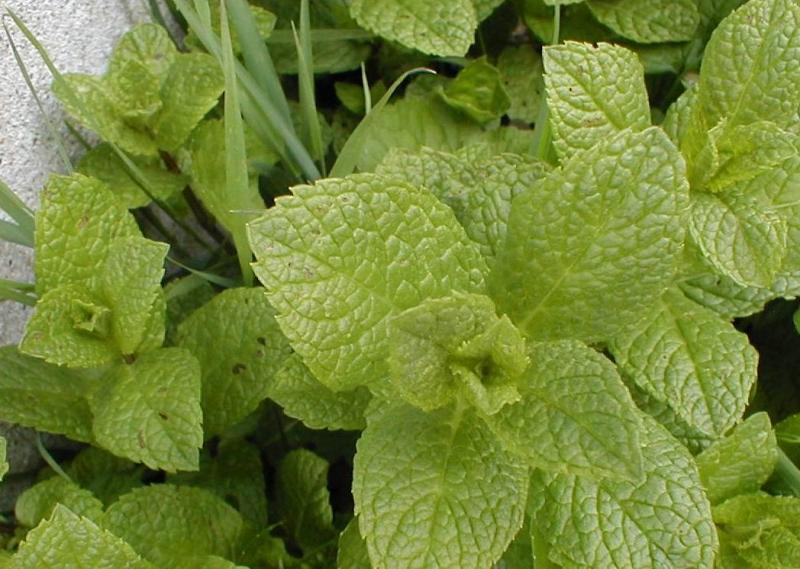
Soothes the lining of the digestive tract and stimulates the production of bile, which is an essential digestive fluid. A
hot cup of herbal tea is an excellent way to settle your stomach after a meal.
(stomach upset and gas)
Excellent breath freshener...just pick a fresh leave & chew on it
Is reputed to have a calming, sedative effect
Relieves nasal, sinus and chest congestion
Yarrow
"This herb has a long history of association with the occult and mystical. The stalks are used for divining the Chinese
I Ching."
A piece of the plant held against a wound will help stop bleeding.
Can help to break a fever
A tea made from yarrow with peppermint and elderflower can be used to fight colds and flu.
Yarrow tea can be of benefit in mild cystitis.
Promotes digestion.
Lowers blood pressure
Yarrow and sage infusion for a nagging cough
Stronger tea is useful as a mouthwash or rinse to treat sore gums
Catnip
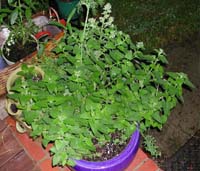
"Catnip has been used since Biblical times as a tea"
High in vitamin C. Stimulates the appetite if served cold before meals; aids digestion if served hot after meals. Hot
tea also makes a soothing nightcap.
Chewing the leaves can relieve a toothache
Chamomile
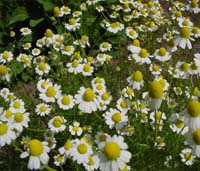
"Chamomile was supposedly dedicated to the sun by the Egyptians because of its curative value in the treatment of chills
and fever"
A good nerve tonic, helps to relax,
Leaves and flowers are good for herbal baths
A rinse made from the leaves is used to brighten blond hair.
Dandelion
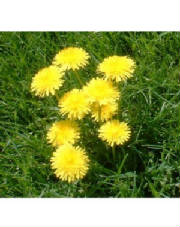
"The feathery seed balls of the dandelion were once used by young girls to determine if their true loves were really
true."
Young leaves are good gathered, washed & added to a lettuce salad (I do this each spring)
My great-great grandmother did this each spring she & many others of her time regarded dandelion greens as a spring
tonic & blood purifier
May aid in the prevention of breast cancer ( recent studies have shown this to be true)
Reduces serum cholesterol
Dried root is often roasted as coffee substitute
Dried leaf infusion is a laxative
Dandelion root tea: Pour 8 oz. of cold water over 2 heaping tsp. of the root, bring slowly to a boil, let steep for 10
to 15 minutes, then strain. Drink 2 cups of tea per day; after breakfast or with breakfast, and before going to bed.
Echinacea (cone flower)
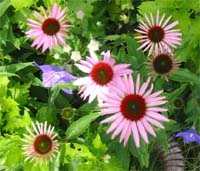
"The Native Americans had the victim of a snake-bite chew the leaves and roots of the plant."
Immune system booster...overall health
I usually buy this at the store. Only buy pure echinacea, with no added herbs or chemicals...you'll want the type that
is made with the WHOLE plant..
I usually take 2 capsules, 2-3 times a day for a week...then stop taking it for a week or two...begin again, stop...etc.
Do not take this on a continuous basis.
I also only take it in the winter or when I've come in contact with colds or flu.
When my children were younger...from age 7 , I gave them 1 capsule, twice daily.
You can grow the flower, dry the leaves and flowers, and make your own capsules.
One can usually buy the empty capsules at most health food stores.
Fennel ( seed)
"Fennel is considered one of the oldest medicinal plants and culinary herbs"
Nursing mothers drink it to help with stimulating lactation
Ground fennel sprinkled on food will prevent gas
Used as an appetite suppressant
Good for the cancer patient after chemotherapy and radiation therapy.
Ginger
"The Spaniards brought the first ginger plants to the New World in the early part of the 16th century."
Freshly ground or as a tea...it's great for nausea, gas
Promotes cleansing of the system through perspiration
Lemon Balm
"John Hussey of Sydenham, England, who lived to the age of 116, breakfasted for 50 years on lemon balm tea sweetened
with honey"
It is a great drink for colds, fever, and flu either hot or cold
Good to drink for menstrual cramps or in bath water as a soother
Rosemary
"Lay Rosemary on thy pillow, to keep thee from all evil dreams."
A great tonic for the scalp and skin, adds luster to the hair (you can make an infusion to use as such)
Rosemary taken internally can cause poisoning...in high doses that is...
Infusions (or tea)
Never boil herbs for teas (seep instead)
A standard infusion is prepared by adding 1 to 2 teaspoons of dried herb (or 2 to 4 teaspoons of fresh herb) to a cup
of boiling water. Seep for 10 minutes before straining. If the herb is left too long, the infusion will become bitter. It's
best to use a ceramic pot with a lid.
The standard dosage is one cup three times a day. It may be taken hot or cold, but infusions prepared for colds and flu
should be taken hot. Never prepare the infusion more than 24 hours in advance.
Capsules
Dry powdered herb can be placed inside empty capsules. This method is preferred by some people who cannot tolerate bitter
herbs in teas
This is just a few of the more simple and most common things nature has given us to use for our benefit.
Safe, used by myself and my family for years
There are many, many other herbs, used alone and in combination, some more complex and too dangerous to list here.
Many common weeds have medicinal uses, but again, many can be lethal if used incorrectly.
Resources I've used include:
Tried and true methods handed down from generation to generation by my Cherokee Great Great Grandmother
(until white man came, the Cherokee had a natural cure for every known illness)
The Green Pharmacy
Healing Foods
|



